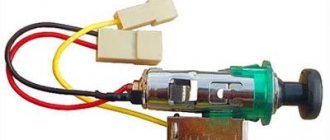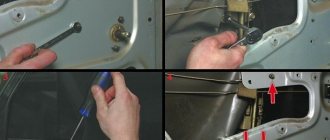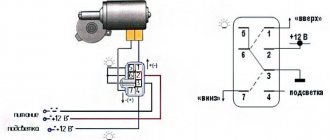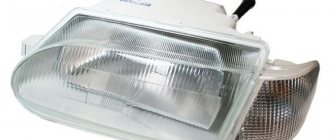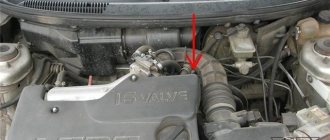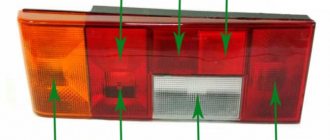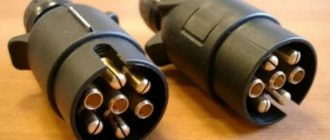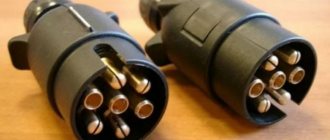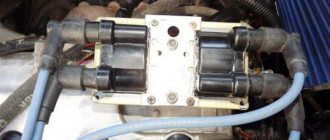If the starter of your car turns normally, but the car does not start, the first thing you need to do is check that the fuel pump is turned on. On domestic cars, its operation can be heard from the passenger compartment; when the ignition is turned on, a characteristic buzzing sound comes from under the rear seat or trunk. If the fuel pump does not work, you need to check the integrity of the fuses and the activation of the main relay of the engine management system and the fuel pump relay. On the VAZ-2107, VAZ-2108, VAZ-2109 and their modifications, relays and fuses are located on the shelf under the glove compartment or under it. On VAZ-2110 and similar ones, you should look in the heater console on the passenger side by unscrewing the fastening screws and removing the side cover. On GAZ cars they are located under the hood on the front wall of the cabin, closer to the passenger side.
What kind of fuel pumps are installed on VAZ 2110/2112 cars
VAZ 2110/2112 cars, depending on the year of manufacture and the type of engine installed, may differ in the method of supplying fuel to the cylinders.
Table: features of fuel supply systems to engine cylinders depending on vehicle modification
| Model/ modification | Year of issue | Engine volume, cm3 | Number of valves, pcs | Injection system |
| VAZ 21100 | 1996–2000 | 1500 | 8 | Carburetor |
| VAZ 21101 | since 2004 | 1600 | 8 | Injection |
| VAZ 21102 | since 2004 | 1500 | 8 | |
| VAZ 21103 | since 2001 | 1500 | 16 | |
| VAZ 21103M | since 2001 | 1500 | 16 | |
| VAZ 21104M | since 2001 | 1600 | 16 | |
| VAZ 21120 | 1999–2008 | 1500 | 16 | Injection |
| VAZ 21121 | 1999–2008 | 1600 | 8 | |
| VAZ 21122 | 1999–2008 | 1500 | 8 | |
| VAZ 21124 | 2004–2008 | 1600 | 16 | |
| VAZ 21128 | 2004–2008 | 1800 | 16 | |
| VAZ 21123 | 1999–2009 | 1600 | 16 |
Only the first modifications of the VAZ 2110 were equipped with a carburetor injection system. From the factory they were equipped with mechanical fuel pumps of the DAAZ brand (catalog number 2108–1106010). Previously, they had proven themselves well on cars of the Sputnik and Samara series.
A mechanical fuel pump was installed in the engine compartment of the VAZ 2110 to the right of the engine valve cover, and was driven by the camshaft.
All injection VAZ 2110/2112 are equipped with submersible fuel modules. The design of such a module includes:
- electric fuel pump;
- coarse filter;
- fuel level sensor.
The fuel module is installed directly into the vehicle tank. In other words, the gas pump is completely immersed in gasoline. Injection VAZ 2110/2112 were and are equipped with electric fuel pumps of domestic, joint or imported production. These are products of the Utes, Pekar, Saratov plant, as well as the world famous one, the pumps of which are equipped in all modern VAZs. The catalog number of the stock electric pump is 2112–1139009. There are also modifications whose numbers have two additional digits: 02 or 03. Depending on them, products may differ in length and diameter.
Design features of fuel pumps for carburetor and injection fuel injection systems
Mechanical fuel pumps, which were installed on the first modifications of the VAZ 2110/2112, have a simple design. It is based on a set of membranes made of special rubberized fabric that is resistant to the chemical action of gasoline. The pump body has two valves: inlet and outlet. The membranes are driven by a rod (pusher). It is driven by a cam mechanism rotated by a camshaft.
Such a mechanical fuel pump can serve for decades until the drive rod wears out or one of the membranes breaks. And even then, if this happens, you can replace these elements in half an hour.
The first modifications of the VAZ 2110 with a carburetor injection system were equipped with mechanical fuel pumps
With an electric fuel pump, things are much more complicated. Its design is based on a small electric motor. It is no different from a regular one, although it works completely immersed in gasoline. The pressure in the system here is created not by a membrane (although there are such pumps), but by a specially shaped impeller mounted on the electric motor shaft.
The service life of the electric fuel pump is 150–200 thousand km. But it can fail much earlier. The main cause of breakdowns when the resource is not used up is additives added to gasoline, as well as various kinds of mechanical impurities. The former destroy the brushes and commutator, while the latter clog the valve mechanisms.
In the injection VAZ 2110/2112, the fuel pump has an electrical design and is part of the submersible fuel module
Signs of a faulty fuel pump VAZ 2110/2112
Signs of pump malfunction appear the same, regardless of its design and type of injection system. These include:
- difficulty starting the engine;
- unstable engine operation at idle speed (vibration, tripping, stopping of the power unit);
- failures during acceleration in motion;
- reduction in power and traction qualities of the engine;
- absence of the characteristic sound of a fuel pump starting (for injection engines);
- presence of traces of fuel leakage (for carburetor power units).
Determining a fuel pump malfunction on your own is quite problematic, because the first three signs, which are the main ones, may indicate other problems in the fuel system, such as:
- fuel filter clogged;
- problems with sensors for mass air flow, throttle position, oxygen level, etc.;
- clogging of one or more nozzles;
- failure of the pressure regulator.
In addition, similar symptoms are observed when problems with ignition occur. It can be determined that the cause of the listed symptoms is the fuel filter by checking the device.
Engine control diagram VAZ 2112
1 - ignition relay; 2 — ignition switch; 3 - battery; 4 - neutralizer; 5 — oxygen concentration sensor; 6 — adsorber with solenoid valve; 7 — air filter; 8 — mass air flow sensor; 9 — idle speed regulator; 10 — throttle position sensor; 11 — throttle assembly; 12 — diagnostic block; 13 — tachometer; 14 — speedometer; 15 — control lamp “CHECK ENGINE”; 16 — immobilizer control unit; 17- ignition module; 18 — nozzle; 19 — fuel pressure regulator; 20 - phase sensor; 21 — coolant temperature sensor; 22 — spark plug; 23 — crankshaft position sensor; 24 — knock sensor; 25 — fuel filter; 26 - controller 2112; 27 — fan switching relay; 28 — electric fan of the cooling system; 29 — relay for turning on the electric fuel pump; 30 — fuel tank; 31 — electric fuel pump with fuel level indicator sensor; 32 — gasoline vapor separator; 33 - gravity valve; 34 - safety valve; 35 — speed sensor VAZ-2112; 36 - two-way valve.
The VAZ-2112 engines and some VAZ-2111 engines are equipped with a distributed phased injection system: fuel is supplied alternately by injectors in accordance with the operating order of the cylinders, which reduces the toxicity of exhaust gases. In this case, a phase sensor is installed on the cylinder head, and a disk with a slot in the rim is installed on the camshaft pulley.
Electrical connection diagram of the ECM Russia-83 Bosch 1.5.4, January 5.1.2 VAZ-21103, 21113, 2112
- — nozzles;
- - spark plug;
- — ignition module;
- — diagnostic block;
- — controller;
- — block connected to the instrument panel harness;
- — main relay;
- — main relay fuse;
- — electric fan relay;
- — controller power supply fuse;
- — electric fuel pump relay;
- — fuse for the power supply circuit of the electric fuel pump;
- — mass air flow sensor;
- — throttle position sensor;
- — coolant temperature sensor;
- — idle speed regulator;
- - knock sensor;
- — crankshaft position sensor;
- — camshaft position sensor (phases);
- — APS control unit;
- — APS status indicator;
- - speed sensor;
- — electric fuel pump with fuel level sensor;
- — oil pressure warning lamp sensor;
- — coolant temperature indicator sensor;
- — oil level sensor;
- - block connected to the ignition system harness;
- — instrument cluster;
- — mounting block;
- — electric cooling system fan;
- — ignition switch;
A - block connected to the ABS cabin group harness; B - block connected to the air conditioner harness; C — block connected to block R of the front harness; D — wire connected to the ignition switch (backlight); E - block connected to the blue-white wires disconnected from the ignition switch; F - to the “+” terminal of the battery; G1, G2 - grounding points; L — contacts of the block to the trip computer; M - contact of the block to the on-board control system unit; N — contacts of the instrument panel harness block and the front harness; R — block connected to block C of the ignition system harness; Z - to the “B+” terminal of the VAZ-2112 car generator.
How to Test a Mechanical Fuel Pump
To check a mechanical fuel pump, you will need the following tools and tools:
- screwdriver with Phillips bit;
- slotted screwdriver;
- key (head) 10;
- key to 13;
- 2 clean dry plastic bottles with a volume of 2 liters;
- a piece of hose (50 cm) of the same diameter as the fuel one;
- 1–1.5 liters of gasoline;
- caliper (ruler);
- stopwatch (clock).
Let's start with performance. A working VAZ 2110 mechanical fuel pump with a obviously clean filter should pump at least 1 liter of fuel per minute. The verification algorithm is as follows:
- We lift the hood and find the pump.
- Using a screwdriver, unscrew the screw of the pump outlet hose clamp. Loosen the clamp and remove the hose from the pump fitting.
A performance test involves measuring the amount of fuel pumped over a specified period of time.
If the amount of fuel pumped in 1 minute is less than 1 liter, the fuel pump is faulty
If the amount of fuel pumped per minute is less than a liter, the pump is faulty. The reasons for this may be:
- faulty valves;
- rupture of one or more membranes;
- clogging of the pump grid;
- wear of the drive rod (pusher).
We carry out further checks in the following order:
- Disconnect both fuel line hoses from the pump.
Disconnect the inlet and outlet hoses
When you press the manual pumping lever, you should feel a vacuum at the inlet fitting, and a pressure of air at the outlet
The mesh filter should not show signs of damage or deformation
Unscrew the two nuts and remove the fuel pump from the studs.
To disassemble the pump you need to unscrew 6 screws around the circumference of the housing.
The length of the pusher should be 82.4 mm
Checking the electrical circuit
Unlike a carburetor engine, where the fuel pump is mechanically driven, on the injection VAZ 2110/2112 a special relay and fuse are responsible for the operation of this device. Therefore, before moving on to diagnosing the pump itself, it is necessary to check the indicated elements. If any one of them is faulty, the pump will not work at all.
Turn on the ignition without starting the engine and listen. When the fuel pump is running, it emits a characteristic “whistle” when started. If it is not there, it means that either the pump itself has failed, or one of the elements of its power supply circuit has failed.
The pump relay and fuse are located in an additional mounting block located inside the vehicle's center console. It can be accessed by removing the plastic trim (near the front passenger's left foot). It is secured with several screws. Under the cover you will find three relays and three fuses. Typically, the fuel pump circuit protection elements are located centrally.
The relay and fuse are located in an additional mounting block under the cladding
To check the fuse, remove it from its socket and “ring” it with a tester. If necessary, replace it, observing the rating (15 A). It is unlikely that it will be possible to check the relay for functionality without special equipment. But you can take another relay, for example, the radiator fan (far left), and install it in place of the one being diagnosed. Turn on the ignition and listen to see if the fuel pump starts working. If yes, buy and install a new relay. If the problem persists, continue diagnostics.
To check the fuel pump relay, you can install the radiator cooling fan relay in its place.
Checking the fuel rail pressure
But even the fact that the fuel pump starts pumping when the ignition is turned on does not mean that it is working properly. The main indicator of its operation is the pressure in the system. You can check it using a regular pressure gauge with a measurement limit of 5–7 atmospheres, which is used to measure tire pressure. In addition, you will need a piece of gas-resistant hose with an internal diameter of 9 mm and two clamps of the appropriate size.
The verification procedure is as follows:
- We relieve the pressure in the system. To do this, disconnect the negative terminal from the battery. We remove the plastic lining of the additional mounting block, which contains the relay and fuse for the gasoline pump. We remove the fuse from the socket. Connect the removed terminal to the battery. We start the engine and let it run until it stalls. After that we put the fuse in place.
- On the fuel rail we find a fitting specially designed for measuring pressure. Using the wheel valve cap, unscrew the spool valve from the fitting.
The fitting is designed specifically for measuring pressure
A regular tire pressure gauge is suitable for measuring fuel pressure in the rail.
For engines with a volume of 1500 cm 3 it should be 2.8–3.2 atmospheres, and for power units with a volume of 1600 cm 3 – 3.6–4 atmospheres. If the device indicators are lower, the pump is unsuitable for further use.
Electrical circuit design of VAZ 2115
The VAZ wiring diagram is a single-wire circuit, which supplies the positive pole from the battery to the remaining elements of the circuit, and the negative pole is the housing.
The electrical circuit of the VAZ is protected from current surges in the form of fuses with fuse links. They were placed under the hood.
Fuses provide reliable protection for such expensive equipment as:
- the circuit in which the ignition switch is included;
- battery charging circuit;
- generator circuit and starter.
The VAZ electrical circuit includes relays that connect:
- headlight cleaners;
- emergency alarm;
- direction indicators;
- windshield cleaners;
- monitoring the serviceability of light bulbs;
- electric lifts;
- electric heated rear windows;
- horn;
- driving lights;
- low beam headlights.
The VAZ wiring diagram is made with wires of a certain color, which are designated by letters. A wiring harness of a certain color is secured with blocks.
The injection engine is controlled by a system that consists of a control unit - ECU - and sensors. The control unit occupies a central place in the fuel supply system. It has a second name - controller. It processes information received from sensors and controls systems that neutralize the toxicity of waste products and the performance of the machine.
There is a constant relationship between these elements - the controller and the sensors, which ensures uninterrupted operation of the drive.
The VAZ wiring diagram includes sensors with the following functions:
- fixing the position of the crankshaft: interacting with the ECU, it allows the car to move;
By studying their operation, you can avoid the troubles caused by faulty sensors.
Thus, the VAZ electrical circuit made it possible to create a reliable and interesting car. You can maintain it and maintain it in working order yourself, using the diagrams.
Performance check
Checking its performance will help make sure that the fuel pump has failed. For this you will need:
- screwdriver with Phillips bit;
- a piece of gas-resistant hose (50–80 cm) with a clamp;
- key to 17;
- empty 2 liter plastic bottle;
- a piece of insulated wire;
- stopwatch.
Performance testing is carried out as follows:
- We remove the back seat. We lift the carpet and find the gas tank hatch under it. Unscrew the two screws (diagonally).
- Once you remove the hatch, you will see the top of the fuel module. Using a 17 wrench, unscrew the nut of the outlet fitting. We put a hose on it and secure the connection with a clamp. We lower the other end of the hose into an empty bottle.
- Disconnect the pump power connector. Using a piece of wire, we supply power to the positive contact of the device from the corresponding battery terminal. We connect the negative one to ground.
- We begin counting the time from the moment the pump starts.
A working fuel injection pump for a VAZ 2110/2112 should pump 1.5 liters of fuel in one minute. If this indicator is lower, the pump must be replaced.
The Lada Kalina fuel pump does not pump and does not work. Reasons, signs
Sooner or later, any car enthusiast is faced with the fact that the gasoline pump of the Lada Kalina fails. Some people immediately go to a car service center, but there are also those who try to fix the problem with their own hands. This procedure cannot be called easy, but it is quite possible to do it yourself.
Lada Kalina fuel pump repair video
https://youtube.com/watch?v=7xPJSUReJKg
The video shows the process of repairing and diagnosing the Lada Kalina fuel pump, as well as some recommendations.
Main signs of fuel pump malfunction and diagnostics
Gasoline pump Lada Kalina
Before proceeding with repairs, it is necessary to determine whether the fuel pump is faulty. There are direct and indirect factors that indicate this. So, let's look at the main signs of a malfunctioning gasoline pump on Kalina:
- Poor engine start when cold.
- The car moves jerkily.
- The motor does not start.
- Insufficient pressure in pipelines.
All these reasons may mean that the fuel pump needs repair or replacement.
Removing the fuel pump
Before you begin removing the Kalina fuel pump, you need to assemble the tools. To carry out this operation you will need: pliers and a screwdriver. So, let's get straight to the process:
- Disconnect the “minus terminal” from the battery.
- Relieve the pressure in the system.
- We dismantle the rear seat sofa.
- Under the carpet we find a hatch from which you need to unscrew the 4 fastening bolts.
Under the rear seat and carpet there is a panel that covers the Kalina's fuel pump. - Disconnect the fuel pump wiring connector.
- Disconnect the fuel hoses.
By pressing the block you can disconnect the fuel hosesDisconnect the inlet and outlet fuel hoses of the Lada Kalina
- Unscrew the fuel pump mounting plate counterclockwise.
The place where the fastening ring should be so that the fuel pump can be pulled out - Once in a certain groove on the body, you can remove the gasoline pump from the fuel tank.
- Installation is carried out in reverse order.
Now the fuel pump has been dismantled and you can begin troubleshooting and repairs.
Repair operations
Before you begin repairing the fuel pump on Kalina, it is worth noting that you need to be 100% sure that this is where the problem lies. If you are not sure, then it is worth checking all other systems, since it is not recommended to disassemble it unless absolutely necessary.
It is also worth noting that repairing this unit should be done slowly and carefully, since the part is fragile and careless movement can only cause harm. So, let's consider the sequence of disassembly and repair processes:
- Use a screwdriver to pry up the drain module and disconnect it.
- Disconnect the ground wire from the pump.
- From the inside we disconnect the intermediate wire connector.
Clogged fuel pump screenThe working part of the Kalina fuel pump
Internal view of the fuel pump housing
Use a screwdriver to pry up the ring and turn it clockwise
- We dismantle the pressure regulator.
- We press the plastic retainer and remove the fuel pump module.
- We remove the filter mesh from the housing.
- We reassemble in reverse order.
Fuel pump mesh for Kalina fuel pump
If during disassembly we identified parts that need to be replaced, then we replace them.
Selecting a fuel pump
If the fuel pump stops showing signs of life, it must be replaced. To select, you need to know the catalog number.
The original article number of the Lada Kalina fuel pump is 1118-1139009. There is also an analogue from the manufacturers Master-sport (1118-1139009-PCS-MS) and Pekar (1118-1139009).
Replacing and repairing the Lada Kalina gasoline pump is quite easy compared to what it seems at first. You can carry out this operation yourself in your garage, if you have a screwdriver and pliers. If the fuel pump is completely out of order, you can easily find a new one. As practice shows, car enthusiasts install the original part.
Replacing the fuel pump on injection vehicles VAZ 2110/2112
- screwdriver with Phillips bit;
- thin slotted screwdriver;
- key to 17;
- key to 7;
- key to 5.
Procedure for replacing the fuel pump:
- Disconnect the negative terminal from the battery.
- Open the gas tank cap for a few seconds to reduce the pressure inside.
- Remove the rear seat, unscrew the screws, and open the hatch.
Unscrew the two screws securing the protective hatch
Disconnect the electrical connector
Using a 17 wrench, unscrew the nuts of the pump fittings
Using a 7 wrench, unscrew the 8 nuts securing the fuel module flange
Using a screwdriver, unscrew the 2 screws securing the fuel level sensor
Use a screwdriver to remove the clamps on the guides
Using a slotted screwdriver and a 5mm wrench, unscrew the bolts securing the fuel pump cover
We remove the fuel pump from the housing and install a new one in its place.
Having completed the assembly, we check the operation of the new fuel pump.
The process of replacing a VAZ 2110/2112 fuel pump, regardless of its design, does not require any special skills and can be done independently. However, if you are not particularly confident in your own abilities, it is better to contact the nearest car service center.
On any passenger car with a gasoline engine, the gas pump serves to supply fuel under pressure from the fuel tank to the metering device - depending on the modification of the engine on VAZ cars, the fuel system can be carburetor or injection.
The fuel pump (BN) on carburetor internal combustion engines of the 2110 car is located behind the valve cover, next to the distributor-distributor; on a car with an injection engine, it is located in the fuel tank (submersible type). If the BN begins to malfunction, the engine does not pull or develop speed, and in many cases the engine cannot be started at all.
Article: 346027
Order code: 095401
- Buy with this product
- show more
- Buy analogues
- There are no reviews for this product yet.
Schematic electrical diagrams, connecting devices and pinouts of connectors
The fuel pump on a car is designed to supply fuel to the combustion chamber. Its operation is controlled using a relay. On a VAZ (depending on the model), the fuel supply unit can be electrical or mechanical - it all depends on the fuel supply system. On a fuel-injected car, the fuel pump is located in the tank. When the ignition is turned on, voltage is supplied to the terminals of the unit and it begins to pump fuel. If the required pressure is created in the system, the relay automatically turns off the fuel pump - the engine is ready to start.
When the ignition is turned on, the relay creates pressure in the fuel lines by turning on the fuel pump (BN) for a couple of seconds. After this, the BN will work either when the engine is cranked by the starter, or when the engine is running.
Sometimes this system needs repairs - there is nothing complicated here, and the editors of the 2Skhema.ru website will tell you how to do it yourself. Let's start with the BN pinout, then we will indicate it on the diagrams and at the end there will be instructions for replacing the fuel supply elements.
Fuel pump circuit (electric)
The design of the electric fuel pump 2110 itself is quite simple - the unit is an electric motor, which is supplied with 12 Volt power. The BN is mounted in a housing, and a mesh is installed at its inlet - a coarse filter. The filter element prevents dirt particles from penetrating into the pump housing, thereby protecting the device from clogging and possible breakdown.
The electrical circuit of the VAZ fuel pump contains the following elements:
- ignition;
- fuse;
- relay;
- wiring;
- the engine control unit.
When you turn the ignition key, power is supplied through the relay to the BN terminals, and the pump begins to pump gasoline. After the input line of the fuel line is filled with gasoline, the ECU (control unit) through a relay gives a command to turn off the voltage - the fuel system is ready to start the engine, all that remains is to crank the engine with the starter.
Fuel pump pinout
The pinout of the VAZ 2114 fuel pump chip includes contacts for power supply to the electric motor, a fuel level meter contact, and a critical residue alarm contact. Thus, the pump block chip includes four contacts:
- Remaining indicator:
- Weight;
- Pump power;
- Fuel level.
The power connector located on the block has a pin part - “male”, respectively, the mating part is “female”. It should be borne in mind that the pump unit is not connected to the on-board network directly, but through an adapter harness, one of the terminals of which is connected to the block and the other to the on-board network.
The following wire colors are used in this harness:
- Black and white – mass;
- Gray – supply voltage;
- Pink – level indicator;
- Blue and red – reserve balance.
Where is the fuel pump relay for VAZ 2110 injector?
Often, due to a relay failure, the engine stops starting; to fix the problem, it is necessary to replace the faulty part. The fuel pump relay (RB) of the VAZ 2110 injector is located in the car interior, under the instrument panel, next to the center console. To get to the pump, you need to unscrew the two screws of the protective plastic casing and dismantle it - of the three elements located here, the “relay” responsible for the operation of the pump will be located in the center (in the figure below, number 5).
Gasoline pump VAZ 2110 injector price
Electric fuel pumps 2110 are produced by various manufacturers; they can be sold either assembled with a housing, or the electric motors themselves can be sold separately. It makes sense to change the BN assembly only when the bulb (body) of the device is damaged; more often than not, only the fuel pump motor itself requires replacement, since it basically stops working.
Main manufacturers of fuel pumps 2110-2112:
For VAZ 2110 injector fuel pumps, the cost may vary; on average, BN can be purchased at a price from 700 to 4500 rubles. The most inexpensive products are produced by Hofer and Pekar; the average price of an electric fuel pump (motor) complete with a Pekar mesh filter is about 800 rubles. The most expensive are Bosch BNs; the cost of the assembled device is 4300-4600 rubles.
Replacing the fuel pump mesh for VAZ 2110 injector
Russian fuel does not always meet quality requirements, and over time, due to poor gasoline, dirt accumulates in the gas tank in the form of sediment. The debris also clogs the filter screen of the electric fuel pump; due to the accumulated dirt, the fuel does not fully enter the fuel line, causing interruptions in the operation of the internal combustion engine. To eliminate the malfunction, it is necessary to clean or replace the coarse filter, but to get to the mesh, you need to remove the BN.
Before starting disassembly, you should reduce the pressure in the fuel system, otherwise, when unscrewing the fuel line fittings, gasoline may escape in a stream and flood the entire interior of the car. To relieve the pressure, remove the fuse responsible for the operation of the BN, start the engine and wait until it stalls. We replace the VAZ 2110 injector fuel pump mesh as follows:
- turn off the ignition;
- in the back seat in the cabin we find hinges, and by pulling them, we fold the lower “seats” forward (right and left);
- there is a hatch on the bottom under the seat, it is secured with two self-tapping screws;
- unscrew the screws and dismantle the hatch;
- disconnect the plug from the wires that supply power to the electric fuel pump; to do this, bend the latch and forcefully pull the parts of the connector away from each other;
- unscrew the fittings of the fuel pipes - main supply and return (17 mm wrench);
- unscrew the nuts of the pressure plate of the used pump (there are 8 fasteners here, 7 mm wrench);
- The nuts are small, it is better to put them in some kind of jar so as not to lose them. Remove the plate and remove the pump assembly from the gas tank. You need to remove the fuel pump together with the rubber sealing ring and lift the pump carefully so as not to damage the fuel level sensor. When removing the BN housing, it is necessary to tilt it, otherwise it will not come out of the tank;
- remove the screen from the fuel pump and install a new part;
- We install the electric fuel pump in place. Here it is important to put the housing in the old places - if you move the used pump, it will be impossible to tighten the fuel line fittings.
Reasons for failure and replacement
VAZ 2110 connecting an electric fuel pump
Fuel pump failure occurs for several reasons:
- driving with an empty gas tank;
- failure to replace the fuel filter on time and much more.
Due to non-compliance with such simple rules, the electric fuel pump wears out. Therefore, malfunctions in the fuel system occur prematurely.
Note: it is necessary to change fuel filters on time, especially when filling with low-quality gasoline. Follow the main rule: the gas tank should always be more than half full.
Preparation for repair
Before starting repairs and replacing the electric fuel pump, you must:
- disconnect the negative terminal on the battery;
- remove the cap from the gas tank to prevent the creation of rarefied vapors;
- check the fuel level, it should be at the middle level in the gas tank, but no more;
- You should also place a fire extinguisher nearby, just check its expiration date in advance.
To relieve pressure in the pipeline, you must start the engine and leave it running until it stops completely.
Note: work must be carried out using a lamp with a protective cap. You need to prepare clean rags and plastic containers in advance for the fuel pump to be removed, as there will be residual fuel in it.
After completing the preparatory work, recline the rear seat and remove the protective cap of the gas tank.
Replacement
VAZ 2110 electric fuel pump diagram
Carry out work carefully, legibly and consistently:
- disconnect the gas tank connector;
- loosen the clamp;
- unscrew the tubes using special wrenches;
- remove the rubber gaskets;
- unscrew the eight bolts on the body;
- remove the sealing ring;
- remove the fuel pump.
Note: replace the rubber gaskets on both pipeline fittings using a repair kit. The fuel pump must be placed on a pre-prepared rag or in a plastic container.
VAZ 2110 electric fuel pump and its removal
The pump is gradually pulled up and tilted towards the backs of the seats to avoid deformation of the float. Remaining gasoline may spill during this work. The last thing is to remove the rubber gasket. When replacing not the entire module, but only the fuel pump, you will have to spend time and effort:
- remove the locking spring from one guide;
- compress the fixation plates;
- disconnect the module;
- remove the fence mesh;
- disconnect the terminals from the pump and fuel level sensor;
- remove the polypropylene fuel pipe, it is connected securely, so you will need to act carefully, but with effort;
- remove and replace the pump.
Note: replacing the fuel pump must be done with replacing the fuel filter.
Malfunctions of the electric fuel pump 2110
If the pump stops working, there may be several reasons for the malfunction:
- electrical wiring is damaged;
- fuse burned out;
- the relay stopped working;
- BN motor burned out;
- The engine control unit has failed.
When a driver in a car with a VAZ 2110-12 injection engine turns on the ignition, the electric motor starts working - a characteristic buzzing sound is heard. If no sounds are noted, it means that the BN is not pumping fuel.
The easiest way is to check the electric fuel pump fuse, which is located almost in the same place as the relay, located to the left of the RB.
If the fuse is blown, it must be replaced. It often happens that when replacing a fuse, it immediately blows. The main reasons for the malfunction of this phenomenon:
- the fuel pump itself “shorts”;
- There is a short circuit in the electrical wiring.
Another characteristic malfunction of the electric fuel pump is that fuel is pumped, but the operation is accompanied by loud noise. A noisy fuel pump is a sure sign that this device will not “live” for long and will soon fail.
No power supplied
As the pinout indicates, there are 4 wires going to the pump:
- in the center - plus and minus;
- at the edges – fuel level control.
To check whether current is flowing, connect a light bulb (12 V) to the negative and positive contacts and turn on the ignition. If everything is in order, it will flare up. If there is no result, the plus and minus removed from the pump connector are connected in turn to its ground, and then to the relay block.
- the lamp (when the negative wire is connected to ground and the ignition is turned on) blinks, then this contact is damaged;
- the improvised indicator did not flash - there are problems with the plus.
If the wire is installed on the relay and the lamp lights up, there is a break between it and the pump. Disassemble the harness and replace the faulty wire. You don’t need pinouts in this situation either.
When it turns out that it was the pump motor that burned out, it will have to be replaced - it cannot be repaired.
How to test a relay
If the electric fuel pump does not show any signs of life when the ignition is turned on, this does not mean that it has burned out. The cause of the malfunction may also be a relay. The easiest way to check the RB by ear is that when you turn on the ignition, the relay should click. If you don’t hear a click, there is a high probability that the “relay” is faulty.
But not everything is so simple - the problem can be “tricky”, for example, the car does not start the first time. The cause of the malfunction may be hidden in burnt relay contacts. It’s quite simple to check the functionality of the pump itself; proceed as follows:
- remove the protective casing, under which there is a block with relays and fuses;
- we unscrew the fastenings of the block, remove it, it remains attached to the wires;
- we pull the RB out of the block, place a jumper between two opposite contacts, thus directly supplying power to the BN;
- If, with such a connection, the electric motor of the pump begins to make noise, it means that the BN itself is working, most likely, the malfunction is hidden in the relay.
If there is no voltage on any of the contacts on the RB block, you should look for a break in the wiring; there may also be poor contact at the place where the wire is attached to the terminal.
Starter malfunctions and reasons for their occurrence
The unit does not spin the flywheel due to many factors. Below we will discuss defects in the immobilizer, pull-out relay, injector, as well as in the car wiring. Sometimes repairs are not enough, in which case the device needs to be replaced.
Faulty injector
The standard version of the VAZ 2110 is not equipped with injectors, but they can be supplied separately. Drivers choose these devices for many reasons: reduced fuel consumption, no need to warm up the engine in cold weather, increased power characteristics.
Article on the topic: We eliminate damage to the front and rear side lights on a VAZ 2114
The arrow points to the starter relay
If the starter is not working well, then you need to check the injector, which may be acting up due to bad gasoline. This is the only drawback of the injector - it requires high-quality fuel. It is also worth checking whether the connection diagram is followed.
Overrunning clutch failure
If the overrunning clutch breaks, the engine starts and runs perfectly. But when the car stops, the engine cannot be restarted; it clicks but does not start. In this case, you need to wait until the power plant has cooled down, and only then try to start it.
Also in this case, it is worth inspecting the wiring that comes from the coupling. Sometimes replacing damaged wires can solve a problem where the engine clicks but won't start. Another sign of a faulty clutch is the radio turning on spontaneously.
Solenoid relay
Once behind the wheel, the driver inserts the key and turns it, the fuel pump starts working, the dashboard lights up, but when turning further, the pump and the panel turn off, and the starter does not turn. In such a situation, the solenoid relay is most likely to blame.
Removing the solenoid relay
First of all, you need to check whether there is voltage going to it. If it does, then it’s worth checking the lock itself or the alarm system, which may close the circuit. If all the elements work separately and do not start together, then the starter does not turn due to the solenoid relay.
Article on the topic: Independent replacement of the front and rear crankshaft oil seals on a VAZ 2110
Poor contact
In this case, the starter starts after several attempts, but it still clicks. This problem occurs due to damaged contacts. The inspection should begin with the battery. If the terminals are oxidized, you need to clean them.
If this does not help, then you should check the starter contacts, because when they are oxidized, the device turns poorly or does not start the crankshaft at all. If the starter refuses to work, but the immobilizer is running, then there is a malfunction in it. Here you won’t be able to remove the defect yourself - you need to go to a car service center. Now readers know how much it costs and why the starter does not work; it is worth doing the work yourself only if you have experience working with wiring.
Fuel check valve
The electric fuel pump of the VAZ “Ten” has good performance, but it creates too much pressure in the fuel system. In order to bring the pressure back to normal, a VAZ 2110 fuel pump valve is built into the fuel line; it is located in the “outlet” fitting of the BN housing. On the “tens”, a pressure regulator is also installed, which is located behind the fuel rail.
A valve malfunction involves a ball sticking in the open position, and the fuel pressure in the system may drop to zero. If such a problem occurs, the car is very difficult to start, since all the gasoline from the fuel lines goes back into the gas tank when the ignition is turned off. Is it possible to somehow repair the valve?
Drivers of 2110 cars claim that you can try knocking on the fitting in the BN flask so that the shut-off ball falls into place. If the malfunction cannot be eliminated in this way, the electric fuel pump bulb must be replaced, since this housing itself is non-separable.
Diagnosis and Troubleshooting
It is relatively simple to verify that the electrical network is faulty - this can be done without removing the fuel pump. When the sound of its operation is not heard when the ignition is turned on, you must immediately check the fuse responsible for this circuit. It is installed in a block mounted at the bottom in front of the front passenger seat. You need to remove the block cover, find the fuse marked F3, rated for 15 A, and replace it. This kind of work can be done on the road.
If the operation of the fuel pump has not resumed, you should switch your attention to relay K2, located in the same block. It closes the power circuit of the pumping device based on a signal from the controller. You can also check the serviceability of the relay in road conditions, for which you will need a piece of copper wire
Diagnostics are carried out in the following order:
You can also check the serviceability of the relay in road conditions, for which you will need a piece of copper wire. Diagnostics are carried out in the following order:
- Remove relay K2 from the connector.
- Turn on the ignition.
- Using a wire, connect the contacts marked “30” and “87”; the numbers are marked on the relay. Another option is to apply power to pin “11” located in the diagnostic connector. The +12 V voltage can be taken nearby, from the cigarette lighter.
- If you hear the pump humming, then you need to change relay K2.
If after the above manipulations the unit is still “silent”, it is necessary to check the integrity of the wiring and the reliability of the contact at the place of its connection. This will require a device, so it will not be possible to carry out such work in the middle of a field. Unless you can check the serviceability of the fuel pump itself by disconnecting the connectors from it and supplying 12 V directly from any convenient source. If the pump still does not hum, it should be replaced.
It will not be possible to diagnose insufficient fuel supply to the injectors under road conditions, unless you carry a pressure gauge with a corresponding hose for connection to the fuel rail. The amount of gasoline supplied is characterized by the pressure in the network, to measure which you will need a pressure gauge. The check is performed as follows:
- Twist off the plastic cap covering the diagnostic fitting. It is located at the end of the fuel rail and is a regular spool.
- Press the spool rod to release the pressure in the line. In case of gasoline leakage, place a small container under the spool. Perhaps the malfunction will make itself felt already at this stage if there is no pressure in the network and no fuel flows from the fitting.
- Unscrew the spool and put the hose from the pressure gauge onto the fitting. With the ignition off, apply 12 V directly to the pump. To clearly record the readings, it must work for at least 10 seconds.
If the pressure is below 3.6 bar, you must first change the coarse filter. If this does not help, then you will have to check the RTD and the tightness of the injectors. This is the only way to accurately determine the source of the problem.
Mechanical fuel pump malfunctions
All parts of a car engine are subject to wear and aging, and the life of a mechanical fuel pump also depletes over time. Main malfunctions of the mechanical device:
- warping of hulls;
- cracking of the diaphragm;
- valve failures.
If the diaphragm allows air to pass through, the pump may stop pumping gasoline into the carburetor; through the torn diaphragm, fuel enters the crankcase and mixes with the engine oil. When gasoline gets into the oil, fuel consumption increases sharply, and the engine itself starts poorly, especially when warm. Checking the presence of gasoline in the crankcase is quite simple - if you light the oil dipstick with a lighter, a fire will occur, and a gasoline smell will come from the oil crankcase.
A common defect that occurs in mechanical gasoline pumps is warping of the surface at the point where the pump is attached to the body of the auxiliary units. If the surface is deformed, engine oil begins to leak at the joint between the planes.
Fuel pump VAZ 2110 carburetor price
Unlike electric fuel pumps, mechanical fuel pumps are generally cheaper; the price largely depends on the manufacturer. The most famous companies producing gasoline pumps:
The cost of the device ranges from 350 to 850 rubles; repair kits are also sold for used mechanical pumps; the kit contains a diaphragm, rod, and valves. The repair kit is quite cheap - from 70 to 200 rubles, but it does not always make sense to carry out repairs, since the pump assembly itself is inexpensive.
An interesting fact is that the fuel pump for carburetor engines for the VAZ “ten” is suitable for the VAZ 2108-09-099 models, as well as for the Zhiguli VAZ-classic 2101-07. The “Classic” BN differs only in a slightly different arrangement of fuel fittings, and in order to install the pump from the “Classic” on a car 2110, it is necessary to use longer fuel hoses.
Dear customers, in order to avoid errors when sending the fuel level sensor harness 21101-3827010РХ, in the “Comment” line, indicate for which engine power system 21114, 21124 or 11183i, 11194i, your car model, year of manufacture.
Electric fuel pump assembly - is an electric fuel pump module with a fuel level indicator sensor assembly. Designed to supply fuel from the gas tank to the engine injectors, as well as determine the fuel level and signal its minimum level in the gas tank with an electronic engine control system (ECM)
1- built-in fuel pressure regulator; 2- fittings for installing fuel lines with quick-release tips; 3- electrical connector; 4 — fuel level indicator sensor.
The VAZ 21126 Lada Priora electric fuel pump assembly is of a submersible type, installed in the gas tank located under the bottom of the car body, in the rear seat area behind the service hatch, which, when opened, can be detected.
The submersible fuel pump is lubricated and cooled by fuel.
The fuel level sensor 21101 - 3827010 as part of the fuel system is used to determine the fuel level and is installed directly in the fuel tank. The fuel level sensor is used in conjunction with the fuel level indicator, which in turn is located on the dashboard. The fuel level indicator sensor is based on the operating principle of changing the voltage (pulse height, frequency) at the sensor output when the fuel level in the tank changes.
The fuel level sensor wiring harness 21101-3827010РХ is intended for connection to the common wiring block, as well as to the FLS wiring block from the fuel pump in cars of the VAZ 2110-2112, VAZ 2113-2115, VAZ 2170 family.
Structurally, the fuel supply sensor is nothing more than a rheostat with nichrome resistance. The movement of the movable adjustable contact is carried out through a float lever, the console of which is equipped with an additional contact point. This additional contact, being in a specific position, closes the control circuit, thereby indicating the need to use the fuel volume of the reserve group, which includes a volume from 4 to 6.5 liters. gasoline.
The fuel level sensor is a device of low reliability. Sometimes it becomes necessary to buy a fuel sensor, because after a certain period of operation, the indicators of this device begin to “jump”, that is, produce incorrect parameters. This is due to the fact that the main disadvantage of such a device is the thinning of the track of the contact group under the influence of the friction force of the runner.
In some cases, you can repair the device by slightly bending the so-called. “rocker arm” (bending) of the runner, thereby placing its working contact surface slightly above the wear area of the contact track. If wear exceeds permissible standards, the FLS fuel sensor must be replaced with a new product.
If the fuel tank is half full and the VAZ fuel consumption sensor shows a zero tank fill value, the following measures must be taken:
— test the technical conditions of the contact group on the rear of the instrument panel and, if necessary, tighten the electrical wiring fasteners;
— check the smooth movement of the float spoke, focusing on eliminating unauthorized stops in intermediate positions.
Due to low-quality gasoline and additives, the internal electrical mechanisms in the electric gasoline pump are corroded. When working dry, the brushes overheat and wear out. With proper operation, the service life of the fuel pump is very long.
Connectors DUT 21101-3827010РХ with assembled wiring are highly resistant to adverse environmental influences (high humidity, saline solutions, oil, gasoline and their fumes, aggressive detergents). Connectors with Cargen wires use wires with copper cores with a cross-section from 0.5 mm to 6 mm.
The wiring harness for the fuel level sensor 21101-3827010РХ, fuel pump in cars of the VAZ 2110-2112, VAZ 2113-2115, VAZ 2170 family satisfies the needs of consumers and complies with the requirements of GOST R51814.1-2004 (ISO/TU 16949:2002).
Replacing the wiring harness of the FLS 21101-3827010РХ, located in the electric fuel pump module, connecting the common wiring block, as well as the fuel pump FLS wiring block in cars of the VAZ 2110-2112, VAZ 2113-2115, VAZ 2170 family, can be done independently, without contacting specialized services service.
When replacing a VAZ fuel sensor, it is dismantled along with the electric fuel pump for supplying fuel.
Other article numbers of the product and its analogues in the catalogues: 211013827010 РХ, 211043827010 РХ.
VAZ 2110, VAZ 2112, VAZ 2113-2115, VAZ 2170.
Any breakdown is not the end of the world, but a completely solvable problem!
How to independently replace the fuel level sensor in the VAZ 21126 electric fuel pump on a VAZ family car.
With the online store Discounter AvtoAzbuka, repair costs will be minimal.
Just COMPARE and BE SURE.
Don't forget to share the information you find with your friends and acquaintances, as they may also need it - just click one of the social networking buttons below.
Ignition system diagram Lada Kalina Lux
1 — oil pressure warning lamp sensor;
2 — coolant temperature indicator sensor; 3 — additional fuse block; 4 — fuses for the electric fan of the engine cooling system; 5 — electric fuel pump relay; 6 — relay for the electric fan of the engine cooling system; 7 - ignition relay; 8 — relay 2 of the electric fan of the engine cooling system; 9 — relay 3 of the electric fan of the engine cooling system; 10 — electric fan of the engine cooling system; 11 — throttle position sensor; 12 — idle speed regulator; 13 — coolant temperature sensor; 14 — diagnostic block; 15 — ignition system harness block to the instrument panel harness block; 16 — solenoid valve for purge of the adsorber; 17 — speed sensor; 18 — ignition system harness block to instrument panel harness block 2; 19 — mass air flow sensor; 20 — crankshaft position sensor; 21 — oxygen sensor; 22 - controller; 23 — rough road sensor; 24 — diagnostic oxygen sensor; 25 — ignition coil harness block to the ignition system harness block; 26 — ignition coils: 27 — ignition system harness block to the ignition coil harness block; 28 — spark plugs; 29 — nozzles; 30 - resistor; 31 — air conditioning system pressure sensor; 32 — blocks of the ignition system harness and injector wiring harness; 33 - phase sensor; 34 - knock sensor. Ignition system wiring harness -11184-3724026-10. Ignition coil wiring harness -1118-3724148-00. Injector wiring harness -11184-3724036. A - to the “plus” terminal of the battery.

